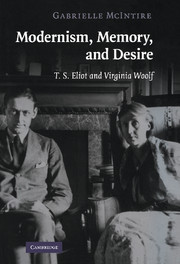Book contents
- Frontmatter
- Contents
- Illustration
- Acknowledgments
- Introduction
- 1 An unexpected beginning: sex, race, and history in T. S. Eliot's Columbo and Bolo poems
- 2 Mixing memory and desire: rereading Eliot and the body of history
- 3 Eliot, eros, and desire: “Oh, do not ask, ‘What is it?’”
- 4 T. S. Eliot: writing time and blasting memory
- 5 Virginia Woolf, (auto)biography, and the eros of memory: reading Orlando
- 6 Other kinds of autobiographies: sketching the past, forgetting Freud, and reaching the lighthouse
- 7 Remembering what has “almost already been forgotten”: where memory touches history
- Epilogue
- Notes
- Index
2 - Mixing memory and desire: rereading Eliot and the body of history
Published online by Cambridge University Press: 22 September 2009
- Frontmatter
- Contents
- Illustration
- Acknowledgments
- Introduction
- 1 An unexpected beginning: sex, race, and history in T. S. Eliot's Columbo and Bolo poems
- 2 Mixing memory and desire: rereading Eliot and the body of history
- 3 Eliot, eros, and desire: “Oh, do not ask, ‘What is it?’”
- 4 T. S. Eliot: writing time and blasting memory
- 5 Virginia Woolf, (auto)biography, and the eros of memory: reading Orlando
- 6 Other kinds of autobiographies: sketching the past, forgetting Freud, and reaching the lighthouse
- 7 Remembering what has “almost already been forgotten”: where memory touches history
- Epilogue
- Notes
- Index
Summary
The world seems a complete nightmare at times; nothing that could happen would be surprising. I wonder if there will ever come a time when we shall look back and find that the period we are living through seems quite unreal in retrospect.
T. S. Eliot, letter to his brother, Henry Eliot, 23 March 1917In this alone we suffer:
cut off from hope, we live on in desire.
Dante, The InfernoTHE WASTE LAND: A POESIS OF MEMORY
Where, one might ask, do we find anything commensurate in T. S. Eliot's canonical writing to the game of sexual display enacted on the scene of global history and cultural memory that he offers us in the sustained experiment of his Columbo and Bolo poems? We might not find the same erotic or histrionic excesses, but the Columbo and Bolo verses are still far closer in their bearings to his well-known poems than we might think, tempting as it is to concentrate on the astonishing gulf between what was “public” about Eliot's poetic output, and what has remained “private” even until now. A major line of continuity between these two bodies of work is to be found in their mutual and persistent blending of memory and desire, history and sexuality, the past and eros. That is, as with the Bolo poems, in Eliot's canonical texts we find a prevailing tropological substructure in his readings of the past which insists that approaching the enigma of anteriority means simultaneously reading desire.
- Type
- Chapter
- Information
- Modernism, Memory, and DesireT. S. Eliot and Virginia Woolf, pp. 39 - 74Publisher: Cambridge University PressPrint publication year: 2008



